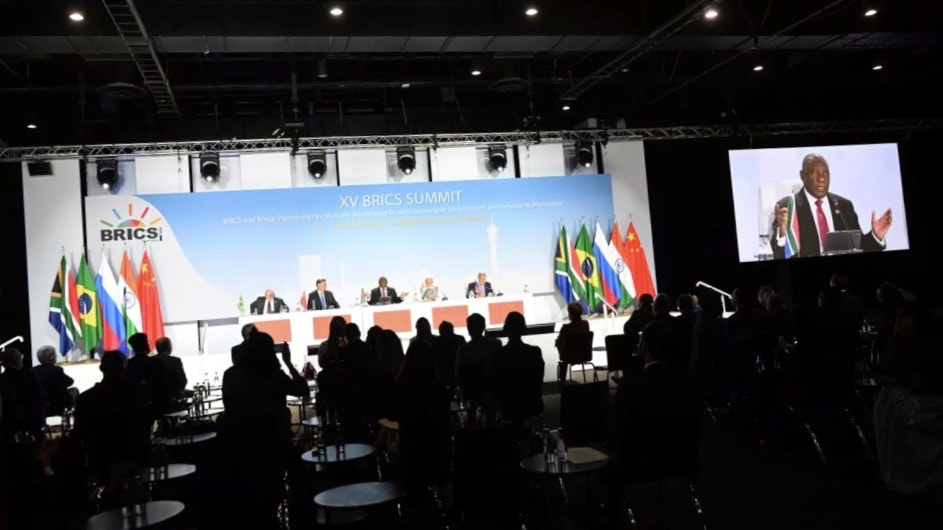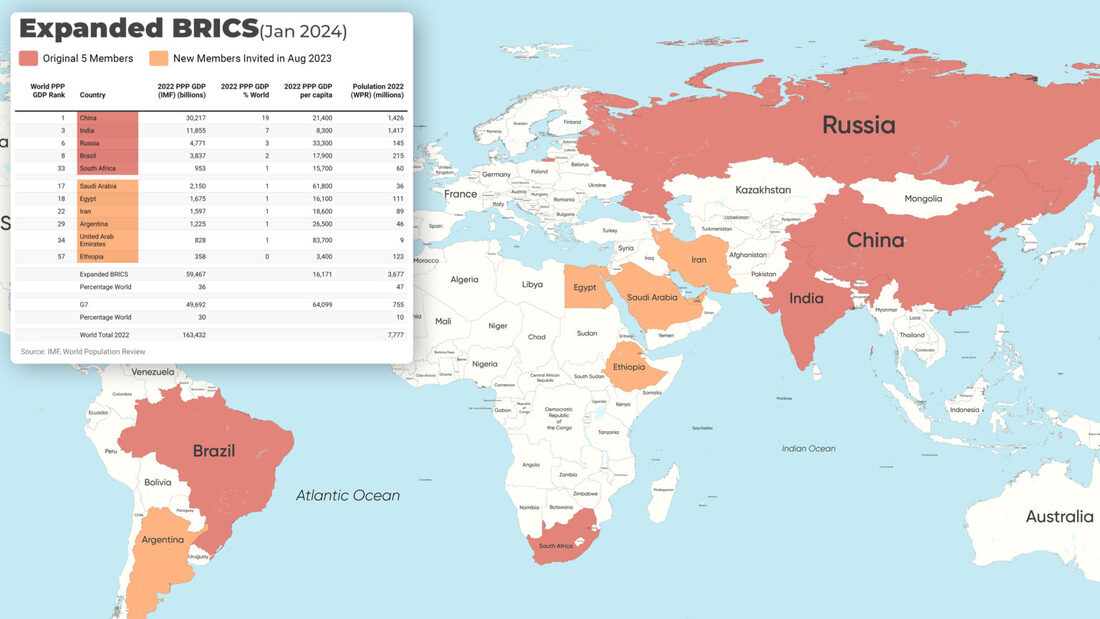|
9/3/2023 BRICS summit ends with six new members and calls for inclusive multilateralism and UN reform By: Peoples DispatchRead NowBRICS has decided to invite six countries to join the bloc — Argentina, Egypt, Ethiopia, Iran, Saudi Arabia, and the UAE. The leaders also agreed on a future plan of expansion and called for increased use of local currencies in trade as opposed to the dollar (Photo: Sputnik) The three-day BRICS summit in South Africa concluded on Thursday, August 24 with the adoption of the Johannesburg II declaration, calling for “inclusive multilateralism” in global politics. The group also announced its expansion. The host of the 15th BRICS summit, South African President Cyril Ramaphosa announced the outcome of the summit, saying that the bloc’s leaders had decided to invite six new members — Argentina, Egypt, Ethiopia, Iran, Saudi Arabia, and the United Arab Emirates (UAE) — effective January 1, 2024. After the inclusion of new members, BRICS will represent 36% of the global economy and 47% of the global population. Ramaphosa also confirmed that the group has decided on a process of further expansion in the future on the basis of consensus. The summit was organized around the theme of ‘BRICS and Africa: Partnership for mutually accelerated growth, sustainable development and inclusive multilateralism’. Brazilian President Luiz Inácio Lula da Silva, Chinese President Xi Jinping, Indian Prime Minister Narendra Modi, and Russian Foreign Minister Sergey Lavrov attended the summit, in addition to Ramaphosa. Russian President Vladimir Putin attended it virtually. Apart from the BRICS countries, more than 60 other countries also participated in the summit, with close to two dozen officially applying for its membership. The joint declaration at the end of the summit stressed on the need to increase the use of local currencies in international trade and other financial transactions. It noted that BRICS members have instructed their central banks to find ways to increase the use of local currencies in international trade and report on their success at the next summit scheduled to be held in Russia. The declaration expressed concern about conflicts across the globe and called for their peaceful resolution. It also demanded the “full and effective implementation of the Joint Comprehensive Plan of Action (JCPOA) [Iran nuclear deal] at an early date.” Inclusive multilateralism The declaration called for fundamental reforms in global governance, particularly in the United Nations and its Security Council to make them “more democratic, representative, effective and efficient and to increase the representation of developing countries in the Council’s memberships.” The summit expressed concern over the use of “unilateral punitive measures” by some countries in complete contradiction to the principles of the UN charter and called for greater respect and adherence to international law and the UN charter. The declaration also called for the promotion of human rights, including the right to development, and addressing issues in a non-selective and non-politicized manner. It demanded that all attempts to link terrorism with any religion, nationality, or ethnicity be rejected. The countries also called for building a global economic consensus and addressing systematic risks while promoting international cooperation to deal with debt vulnerabilities and support economic recovery in crisis-affected countries. They called for faster completion of the ongoing review of the International Monetary Fund’s (IMF) quota system with the objective of restoring their “primary role” and demanded that “any adjustments in quota shares should result in increases in the quota shares of emerging markets and developing economies (EMDCs) while protecting the voice and representation of the poorest members.” Restoration of rules-based multilateral trading system The BRICS countries demanded an “open, transparent, fair, predictable, inclusive, equitable, non-discriminatory and rule-based multilateral trading system” with the World Trade Organization at its core and special and differential treatment for developing countries. In recent times, developing countries, especially the US, have been undermining the World Trade Organization (WTO), They also called for a “a fair and market-oriented agricultural system, ending hunger, achieving food security and improved nutrition,” claiming that “trade restrictive measures which are inconsistent with WTO rules, including unilateral illegal measures such as sanctions” affect agricultural trade and must be avoided. The declaration emphasized the “importance of G20 to continue playing the role of the premier multilateral forum in the field of economic and financial cooperation that comprises both developed and emerging markets.” It noted that BRICS countries are working to develop a “fast, inexpensive, transparent, safe and inclusive payment system” for international trade. This is seen as a response to the political use of the existing international payment systems by some developed countries. The BRICS countries stated that they look forward to a greater role played by their New Development Bank (NDB) “in promoting infrastructure and sustainable development of its member countries.” They confirmed that three countries, Bangladesh, Egypt and the UAE, have joined the NBD as new members. They also expressed desire for the faster operationalization of the BRICS Think Tank Network for Finance that was established last year. AuthorThis article was produced by Peoples Dispatch. Archives September 2023
0 Comments
Leave a Reply. |
Details
Archives
July 2024
Categories
All
|


 RSS Feed
RSS Feed